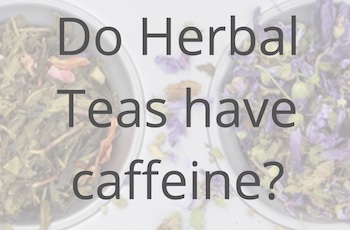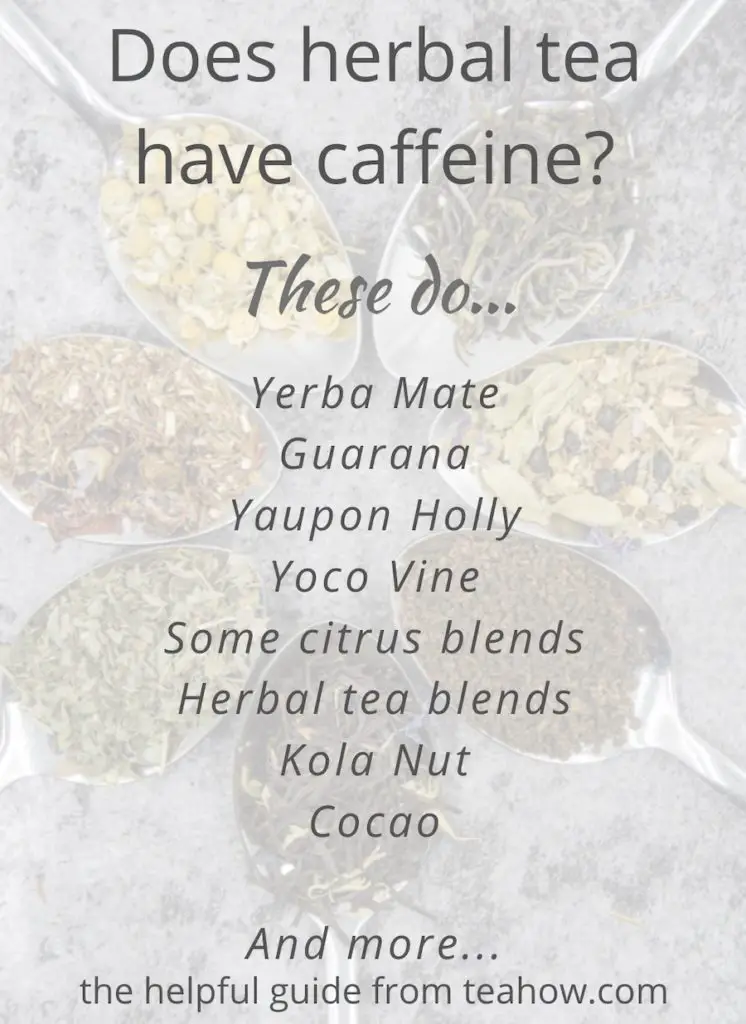Those looking to reduce or remove their caffeine content can turn to decaf, decaffeinated, or plain herbals to get away from caffeine. And herbal teas seem to be the best answer to no caffeine at all.
But what amount of caffeine is actually in any of the herbal teas you might choose? Or even, does herbal tea have caffeine at all? This guide will help you
I’ve written extensively about caffeine levels in various types of tea, and here I’m tackling the question – does herbal tea have caffeine. The short answer is yes, actually, some do…
Most herbal teas do not contain caffeine, however, there are exceptions such as yerba mate, or guarana tea. Caffeine is also intentionally blended with some herbal teas. It’s always advisable to check the label for added tea blends, as well as added ingredients like cacao or kola nut.
I have a number of caffeine-related articles which I’ve linked to further down to check out. But let’s move on to provide more information on the caffeine content in herbal tea.
Does herbal tea have caffeine?
As I mentioned previously, the vast majority of herbal tea is caffeine-free. You don’t need to do extensive research in choosing your herbal tea to find one without caffeine.
So don’t be put off herbal tea if you’re looking for the best caffeine-free alternative, there are plenty to choose from.
Caffeine doesn’t form any part of the ingredients at all for the vast majority of herbal teas.
But, it’s just helpful to know which ones to avoid before you stack up all the herbal teas in your tea cupboard. You do have a special tea cupboard, right?
Strictly speaking, herbal tea is not tea at all. They are Tisanes because they’re derived from flowers, leaves, fruits, seeds, roots, etc of a variety of plants that are not the tea plant.
Tisanes are labeled as “tea” because “tea” is the nearest beverage you can compare it with.
But officially, to be called tea, the leaves must originate from the Camellia Sinensis – that’s the tea plant. These bushes produce the true types of tea.
You can read more about how tea is grown, harvested, and produced – I’ve gone through the full works!
So to avoid real caffeine in tea, you’re looking to steer clear of the following true teas:
I always like to add yellow tea to the list too. Not sure why people miss it off? Anyway, here’s my article on Green tea vs Herbal tea for some further information.
I’ve added a list below of the types of herbal tea that are absolutely free from caffeine. Then I’ll go through all the exceptions.
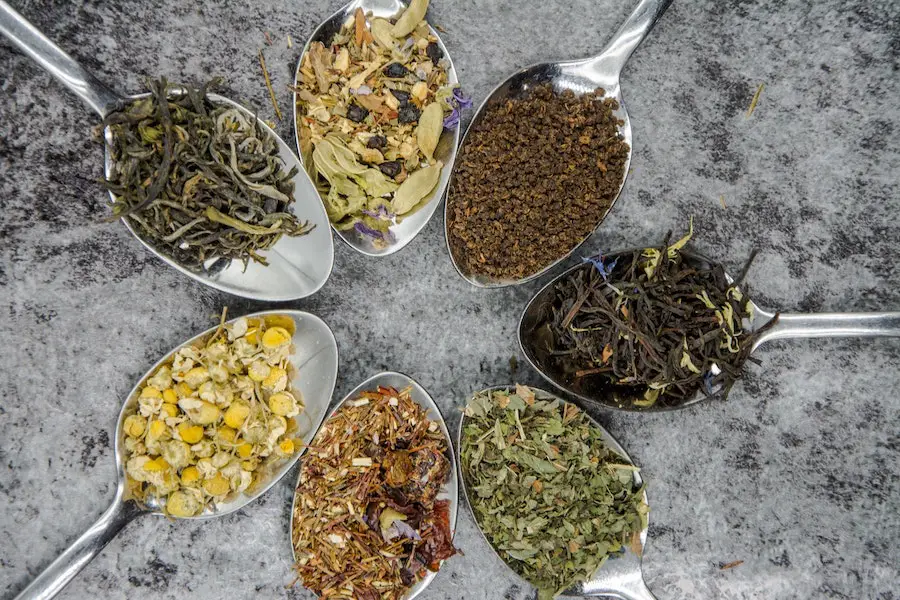
Herbal teas without caffeine
Look for what I would term “100% pure caffeine-free herbal teas” if you want to avoid pretty much any confusion about them having caffeine.
By way of examples, here’s a quick list of the common “pure” herbal teas you can choose from and be totally safe. Just make sure there’s nothing else added…
| Chamomile | Mint | Ginseng |
| Hibiscus | Jasmin | Eucalyptus |
| Ginger | Rooibos | Hawthorne |
| Echinacea | Rose Hip | Dandelion |
| Passionflower | Cinnamon | Sage |
Notably absent from the list are citrus varieties. They could probably be on your list, but I’ve left them out for reasons I’ll explain shortly.
As a side note – If you’re looking for a herbal tea for the morning, then I have a caffeine-free section of teas you can choose from in my article on best morning teas.
Herbal teas that contain caffeine
Now we’re on to the items you need to steer clear of. If you’re staying clear of any caffeine, or if you’re sensitive to caffeine then this will be important for you to know – if you don’t already.
Many people think you just need to steer clear of a couple of teas, but actually, there are quite a few …and there are added ingredients you need to avoid too.
First, let’s go through the list of 8 exceptions where herbal teas contain caffeine to some degree or another.
Some you may have heard of, some may be new – but good to know about…
1. Yerba mate – very high in caffeine
Mate is produced from the Yerba mate bush native to South America. It’s a species of Holly plant. It’s considered very high in caffeine. For a number of South American countries, it’s their equivalent to coffee.
Mate is a soft beverage traditionally consumed in central and southern South America. Popular in Paraguay, Argentina, Uruguay, southern and central-western Brazil, as well as Southern Chile, and Bolivia. Produced from the Yerba Mate plant (Ilex paraguariensis) and drank through a straw called a bombilla.
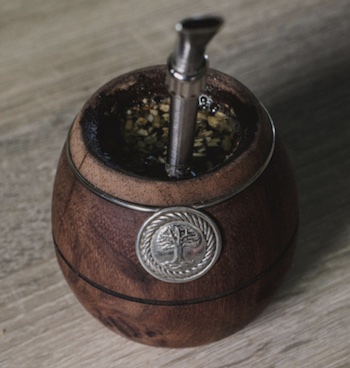
The twigs and stems of the Yerba mate plant are added into a cup called a gourd, and hot water is added. You then drink your mate through a special, filtered straw, called a bombilla. The leaves remain, and you simply keep adding hot water till the taste eventually fades.
The twigs and stems of the Yerba mate plant are added into a cup called a gourd, and hot water is added. You then drink your mate through a special, filtered straw, called a bombilla. The leaves remain, and you simply keep adding hot water till the taste eventually fades.
You may not have heard of it, but mate is available on Amazon. You can even buy it as a canned energy drink … what does that tell you?
Or you might see mate packets in your local herbalist store, and occasionally on shelves in large superstores. It’s certainly worth a try if you want to also get the right mate gourd and bombilla.
Mate caffeine content
Surprisingly, mate has a higher caffeine content than coffee. But it’s “cleaner”, as it doesn’t make you buzz or crash the same as coffee does. But the more leaves you add, the stronger the resulting drink.
Like with many teas, it’s often hard to determine the level of caffeine as the strength of caffeine varies annually based on the overall quality of crop results each season.
I’ve written everything you need to know about yerba mate here. From how to grow it through to how to make it!
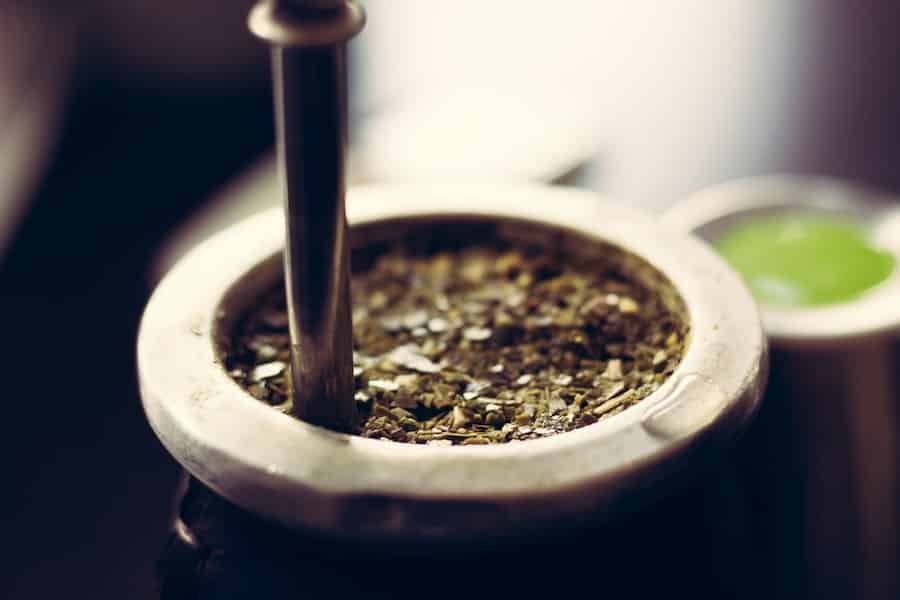
2. Guarana – high in caffeine
Second on my list is Guarana herbal tea, from the Paullinia cupana plant, and is an even lesser-known drink that mate. But still high in caffeine.
Guarana tea is made from the seeds of the Paullinia cupana, a climbing plant native to the Amazon basin. It is drunk widely in Paraguay, Brazil, and Peru. It has health benefits similar to that of green tea. Among other ingredients, it has a high caffeine level comparable with coffee and mate.
Again, it’s one of the South American herbal teas that you would need to watch out for. And it may be another you’ve not heard of, but at least now you know – it’s has a lot of caffeine in it.
For those who love their caffeine, you can also get Guarana on Amazon too in cans, and as supplements, here’s the selection of Guaran products.
3. Yaupon holly – high in caffeine
A relatively recent contender in the herbal tea market is Yaupon tea, from the Liex Vomitoria plant, a form of a holly bush. It has a number of health benefits and is now mass-produced as black tea and shipped globally.
Yaupon tea is derived from the wild North American plant Ilex vomitoria. It is the only native North American species that contains caffeine. And recently revived and mass-produced as black tea for sale globally. It doesn’t become bitter when steeped for longer and is a natural rival to mate.
Yes, you can get this in the stores too. So, check out this yaupon selection which contains other herbal ingredients too such as mint. This also supports what I’m talking about regarding herbal teas containing caffeine – sometimes without you realizing it.
So, if it says “mint and yaupon” you know what’s in it!
As Yaupon tea is the most recent addition to this herbal tea lineup, you may not be familiar with the taste. So, in the event that you would like to try it…
What does yaupon tea taste like?
Yaupon tea has a flavor that would resonate with black tea drinkers and mate drinkers alike. Mild floral, green, and yet earthy, and almost no bitter undercurrents to it mostly due to its lack of tannins. It can steep without becoming more bitter and has the same caffeine level as yerba mate.
4. Yoco vine – high in caffeine
I’m adding Yoco vine, but it’s very rare to get. I’m adding it because strictly speaking it is a herbal tea and does contain caffeine. It may be available from some specialist retailers.
Yoco vine or Paullinia yoco, is a tropical vine and relative of Guarana. Originally drank as a beverage by various indigenous tribes of the Amazon who use it regularly as a morning stimulant. It has 2% caffeine and is an intoxicant. Known to grow only in Colombia, Peru, and Ecuador
I suspect as it’s used as an intoxicating substance – that probably explains why it’s very difficult to get hold of as a herbal tea.
5. Citrus blossoms – can have traces of caffeine
Citrus herbal teas are interesting. You’re safe to drink citrus herbal teas in the main. The only caution to be aware of is the possible presence of trace elements of caffeine. No caffeine has been found within the fruit, but has been found in the leaves and flowers of the plant.
Scientific research carried out on over 10,000 species of plants found that 7 of them contain varying degrees of caffeine. Those being: Coffea, Camellia, Theobroma, Herrania, Cola, Ilex, and Paullinia. Some of which you might recognize from my list of caffeinated herbal teas above.
The report showed the presence of caffeine, just in the very low quantities of 6 and 50 ppm (parts per million) present in the leaves and flowers of several Citrus species. Especially pertinent to orange, lemon, and grapefruit.
The caffeine levels in citrus leaves and flowers aren’t something to be alarmed about. The level is considered very low. In most cases, For those who are caffeine sensitive, just be wary of any dried leaves in orange, lemon, or grapefruit herbal teas
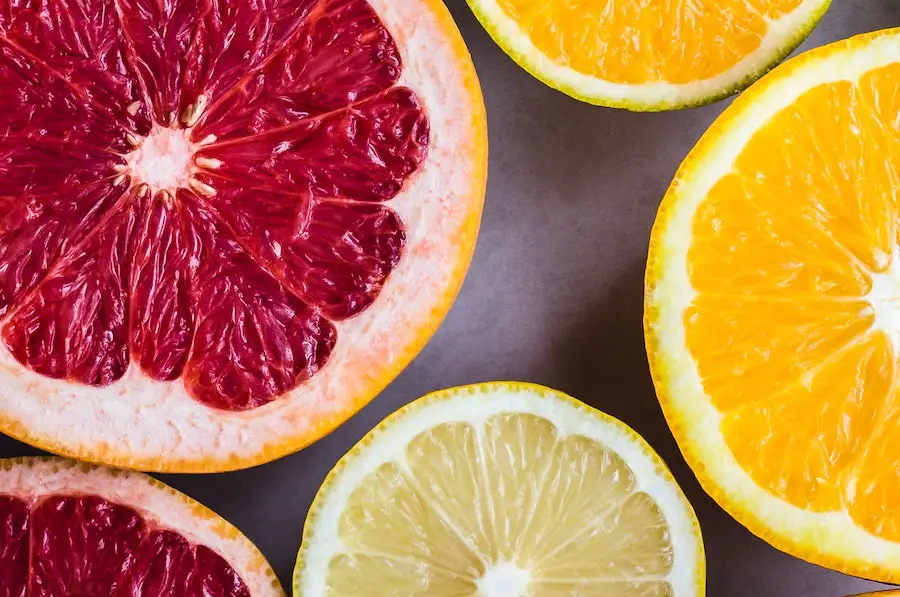
Caffeine has actually been found in some honey varieties too. Based on bee activity near caffeinated plants. But this isn’t anything to worry about, it hasn’t been fully scientifically tested as yet. Here are the benefits of honey in your green tea – you’ll be suprised!
6. Herbal and true tea Blends – medium caffeine
This one might be more obvious to some of you, but often herbal teas are mixed with true tea types.
I mentioned earlier about Yaupon being mixed with mint. Likewise, you will possibly come across something like “Sencha tea blend”. Well, sencha is green tea, so it will be caffeinated.
They do however need to declare this on the packaging. So just be sure to check the label and packaging before purchasing.
7. Decaffeinated, (Decaf) – low to medium levels of caffeine
Decaffeinated teas are not completely devoid of caffeine. The words “decaffeinated”, or “decaf” are a marketing buzz phrase and just sound more definite, so it’s the same thing.
Decaf teas are mostly black or green teas. But the process of taking the caffeine out of tea not only drastically strips it of its overall goodness but it’s impossible to completely remove all the caffeine.
In fact, it’s a bit of a trick, because actually, the caffeine is so hard to remove that it’s hardly noticeable.
The percentage of caffeine in tea varies based on tea type and preparation but generally averages 3.5%. The percentage amount of caffeine in decaf tea by law must be under 2.5%, and most are around this amount. Decaf, therefore, represents an approximate 1% decrease in caffeine level.
This reduction does make a difference, but it’s certainly not totally caffeine-free, just keep this in mind.
You might also see a pure mint tea that says decaf on the packaging. This is just stating the obvious and is a marketing ploy.
It’s simply there to get attention and make you think – ”wow, it must be even more healthy”. But on 100% herbal organic teas (see above table for examples) you can just ignore these labels.
Caffeine-free labels matter
This is the kind of label you need to look for, where it states caffeine free, see the image below as an example.
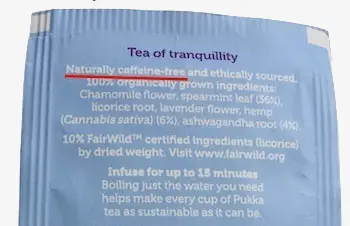
Caffeine-free labels are what you need…
“Caffeine-free”, or “free from caffeine” teas, however, should only be applied to labels of beverages that truly contain zero caffeine. Here’s a real example of a label that states it’s caffeine-free. It’s a rooibos tea, so it will not contain caffeine.
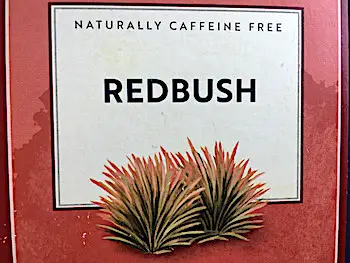
Caffeine-free label example
Here’s another example on a box clearly showing that it is caffeine-free. This is Rooibos tea, so it will be.
8. Artificially added caffeine – some caffeine content
Most beverages can have caffeine artificially added, caffeine can even be artificially added to herbal teas. Check the packaging, any “added caffeine” should be declared on the box or label. Look for “caffeinated”, or “added caffeine”.
Also, it’s worth checking that the label does not state any of the caffeinated teas, “with black tea” means it will have caffeine. The same goes for green, white, oolong, (yellow), Pu-erh, and any of the other caffeinated teas I’ve mentioned above like yerba mate.
Now let’s go through the list of other ingredients that contain caffeine and might be present in your herbal tea…
Herbal tea ingredients that contain caffeine
You might find these in your herbal tea, or think about adding them…
1. Kola nut – high in caffeine
Kola nuts are a caffeine powerhouse. The name might be familiar to you, as it was previously the nut essence used to make coke brands. These days, they just use artificial flavorings instead.
Nonetheless, if you see this ingredient in your tea choice, expect a hefty dose of caffeine.
2. Cacao – medium caffeine
Cocao is essentially what we all know as chocolate. And most of us know that chocolate contains an element of caffeine.
If that “mint and chocolate” herbal tea on the shelf looks tempting, then just know that it might contain caffeine. According to experts, dark chocolate contains 12 milligrams of caffeine per ounce and milk chocolate contains 9 milligrams per 1.55 ounces. But White chocolate contains zero caffeine.
More tea help…
Wow, ok so it’s comprehensive, but it’s factual. You asked “does herbal tea have caffeine” … well, all the “herbal teas” I’ve added here do indeed contain caffeine.
Be sure to check out some of my other related articles. And also check out my Tea Sommelier Course to enhance and fast-track your tea skills! Take your tea a huge steep forward.
…I’m off to buy some mint and white chocolate tea!
